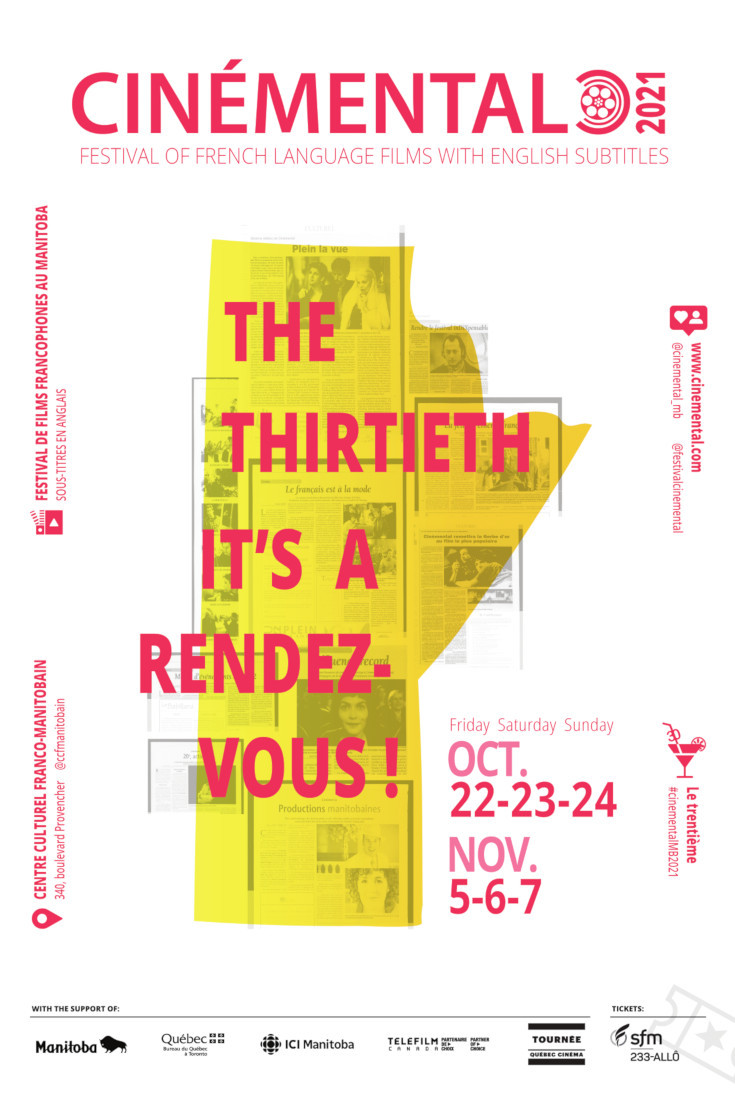A Cinematic Rendezvous
Cinémental celebrates its 30th edition
Supplied photo
The festival, which takes place at the Centre culturel franco-manitobain (CCFM), was established in 1991, when three cinema enthusiasts (Martine Bordeleau, Lucie-Madeleine Delisle and Chantal LeDorze) saw the need for a French film festival in Manitoba.
Now celebrating its 30th edition, festival coordinator Mélanie Bédard says Cinémental will screen a diverse selection of local, national and international French-language films.
“We’re not only (programming) those who have been in the industry for a long time and those that have their roots, but also the newbies that are getting out there and exploring their passions,” Bédard says.
Vous ne parlez pas français? Not a problem! Bédard says the vast majority of the films will include English subtitles, and those that do not will be specified in the program.
Aside from the screenings, Cinémental also coordinates a series of outreach projects with the vision of expanding appreciation for French films. Their school program engages French and French-immersion students between the ages of eight and 18 through screenings and workshops catered to different grade levels.
“It’s always important to be able to explore your own culture and language within the day-to-day that you’re able to do in any other language. We’re surrounded by the English language, but it’s important for us to be able to do those things, have fun, be creative and bring the community together,” Bédard says.
Caroline Monnet, an Anishinaabe/French filmmaker and multidisciplinary artist from Outaouais, Que., screened her feature film Bootlegger in the October half of the festival. Bootlegger chronicles the journey of Mani, an Indigenous graduate student who witnesses the consequences of illegal alcohol trafficking after returning to her reserve.
“It’s really a movie about self-determination and intergenerational resilience,” Monnet says.
For many francophone Indigenous filmmakers in Canada, Monnet says there is an additional degree of marginalization due to an English language barrier. Festivals like Cinémental provide a platform for francophone Indigenous voices to reach audiences outside of Quebec.
“If you don’t speak English, you don’t have access to all the resources and the other filmmakers that are out west and vice versa,” she says. “There’s a gap between the francophone and anglophone Indigenous (film) communities, so it’s very important, for me anyway, to create francophone Indigenous cinema.”
As Indigenous representation emerges as increasingly necessary in Canadian film and media, Monnet stresses the importance of narrative sovereignty. While institutions are beginning to recognize that need, she says it is crucial to accept a diversity of genres and stories.
“We need to be given the opportunity to (tell) very diverse stories. We’re not just one single thing. We have very different realities, and I think that’s important to take into account,” Monnet says.
For Cinémental’s festival schedule, ticket information and programming, visit en.cinemental.com.http://en.cinemental.com
Published in Volume 76, Number 08 of The Uniter (November 4, 2021)






